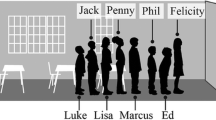Abstract
The research reported here has sought to identify target skills and abilities that will compose a future numeracy, so that new expertise can be incorporated and the exposed “deficiencies” remedied within a dynamic rather than static concept of competency. A nation-wide selection of panellists contributed to a three-round Delphi process, with the final data comprising both structured responses and qualitative comment. The scope of the items covered calculating activities, writing activities, reading activities, physical skills, supporting (mental) skills, applications, and problem solving. Responses to the structured items have provided priorities for numeracy for the turn of the century, in terms of both expected and desired characteristics. In general, expectations for numeracy fall short of the levels deemed desirable by panel consensus. The qualitative comments have been incorporated into three scenarios reflecting altermative visions for the future. A comparison of the scenarios uncovers wide differences between informed thinkers with respect to future visions of the ends, means, and mechanics of learning. These differences among individuals who are otherwise consistent in their views of future needs must be addressed if the identified priorities are not to be lost in a quagmire of conflicting interests, opinions, priorities, and values.
Similar content being viewed by others
References
Australian Education Council Project Team.: 1990, Principles for the Teaching of Mathematics in Australian Schools Australian Education Council, Canberra.
Australian Mathematics Education Project.: 1980, A Statement of Basic Mathematical Skills and Concepts, Curriculum Development Centre, Canberra.
Bernstein, B.: 1971, “On the classification and framing of educational knowledge”, in M. Young (ed), Knowledge and Control, Collier Macmillan, London, pp. 47–69.
Boston, K.: 1988, “Schools to stress the three Rs”, Adelaide Advertiser, November 9.
Bowles, S., and Gintis, H.: 1976, Schooling in Capitalist America: Educational Reform and the Contradictions of Economic Life, Routledge and Kegan Paul, London.
Cockcroft, W. H.: 1982, Mathematics Counts, Report of the Committee of Inquiry into the Teaching of Mathematics in Schools, Her Majesty's Stationery Office, London.
Cooley, M.J.E.: 1980, “Computerization — Taylor's last disguise”, Economic and Industrial Democracy, 1(4), 523–539.
Gordon, R. and Kimball, L. M.: 1985, “High technology, employment, and the challenges to education”, Prometheus, 3(2), 315–330.
“Hobart Declaration on Schooling”: 1989, Australian Newspaper, October 12, p. 3.
Jones, B. O.: 1982, Sleepers Wake: Technology and the Future of Work, Oxford University Press, Melbourne.
Linstone, H. A. and Turoff, M.: 1975, The Delphi Method — Techniques and Applications, Addison-Wesley, Reading, MA.
Martin, J. and Norman, A.: 1973, The Computerized Society, Penguin, Harmondsworth.
Masters, G.: 1989, “Back to Basics, 1, 2, 3”, Sydney Morning Herald, June 28.
Mathematical Sciences Education Board (U.S.).: 1990, Reshaping School Mathematics, National Academy Press.
McGaw, B., Long, M. G., Morgan, G., and Rosier, M. J.: 1989, Literacy and Numeracy in Victorian Schools, Research Monograph 34, Australian Council of Educational Research, Hawthorn.
National Council of Teachers of Mathematics.: 1977, Position Statement of Basic Skills, Author, Washington, DC.
Organisation for Economic Co-operation and Development.: 1989, Schools and Quality, Author, Paris.
Roberts, F. S.: 1976, Discrete Mathematical Models with Applications to Social, Biological, and Environmental Problems, Prentice Hall, Englewood Cliffs, NJ.
Rutherford, F. J.: 1989, Project 2061-Phase 1, American Association for the Advancement of Science, Washington, DC.
Sawyer, W. W.: 1963, “Not classical, not modern, but mathematics as a whole”, Mathematics Teaching, 25(Winter), 29–32.
Spitzer, D. R.: 1987, “Why educational technology has failed”, Educational Technology, 27(September), 18–21.
Watkins, P.: 1986, High tech, low tech and education, Deakin University, Greelong, Vic.
Willis, S. and Kissane, B.: 1989, “Computing technology and teacher education in mathematics”, Discipline Review of Training of Teachers of Mathematics and Science Volume 3, Department of Employment, Education and Training, Canberra, pp. 57–92.
Author information
Authors and Affiliations
Rights and permissions
About this article
Cite this article
Galbraith, P.L., Carss, M.C., Grice, R.D. et al. Towards numeracy for the third millennium: A study of the future of mathematics and mathematics education. Educ Stud Math 23, 569–593 (1992). https://doi.org/10.1007/BF00540061
Issue Date:
DOI: https://doi.org/10.1007/BF00540061




